6 Weight Loss Supplements for Women (& What to Look For in a Weight-Loss Supplement)

The 6 Best Weight Loss Supplements for Women
Finding the best weight loss supplements for women (or anyone, really) can be like finding a needle in a haystack — except the needle might not actually be there.
That’s because weight loss supplements aren’t approved by the FDA (U.S. Food and Drug Administration), and many have shaky science behind them at best.
Yikes.
Having said that, some supplements show promise, including magnesium, caffeine, green tea, protein, fiber and vitamin B12.
Below, we’ll cover the best weight loss supplements for women, science-backed alternatives to consider and what to look for when buying supplements.

What Are the Best Weight Loss Supplements for Women?
When it comes to weight loss supplements for women, there’s a lot out there you’re going to want to avoid. Fortunately, a few dietary supplements show some potential.
Here’s what might help.
Magnesium
Magnesium has some pretty important jobs in the body. It creates new proteins, regulates blood pressure and helps keep blood sugar in check — among other things.
Magnesium deficiency can lead to chronic low-grade inflammation, which is linked to:
Obesity
Diabetes
Sleep disorders
Depressive symptoms
Cardiovascular diseases
So, you can see where magnesium supplements could break this link.
Here’s what the science has to say.
A 2023 study with 1,000 participants — both men and women — found that blood magnesium levels were inversely associated with fat mass. In other words, the lower the magnesium levels, the higher the fat mass.
This link was stronger for those who got enough sleep and didn’t have chronic health conditions like diabetes, depression and high blood pressure.
There was no gender difference, so magnesium supplements may help both men and women. And magnesium deficiency was pretty common in the study — more than half of participants had less-than-great magnesium concentrations.
Magnesium supplements may help in your weight loss journey.
A 2020 systematic review and meta-analysis looked into 32 studies on magnesium supplements. The studies were pretty varied — they lasted six to 24 weeks and compared doses of 48 to 450 milligrams (mg) a day.
The results found that magnesium supplements caused a “great reduction in BMI” — or body mass index.
Supplements were found to be more useful for certain groups than others, though.
Overall, there wasn’t a significant change in body weight, waist circumference, waist-to-hip ratio or body fat percentage. But in certain subgroups, there was a significant change in body weight and waist circumference for:
Participants with obesity
Those with high blood pressure
Participants with insulin resistance-related disorders
Those who were deficient in magnesium at the start of the experiment
Women!
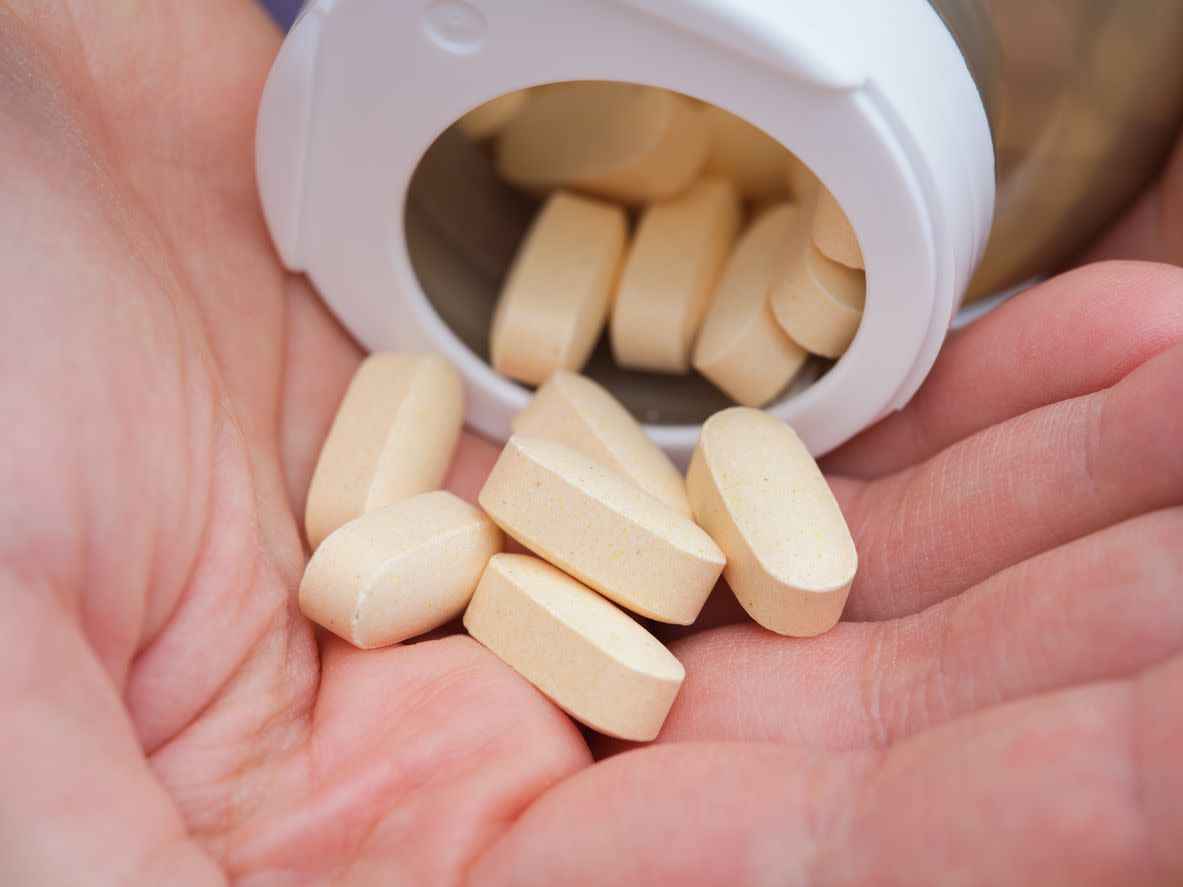
Magnesium Pros and Cons
Magnesium supplementation may be especially crucial in women because they might need more magnesium during pregnancy. Also, certain conditions affecting women, like polycystic ovary syndrome (PCOS), can impair magnesium absorption.
Pros:
Magnesium deficiency is common, largely undiagnosed and may especially affect women.
Sleep disorders and depressive disorders are linked to obesity and magnesium deficiency, so magnesium supplements may pack a one-two punch for weight loss. More research is needed on this, though.
There’s some promising science behind magnesium supplements as a weight loss aid.
Cons:
Magnesium supplements may not be as beneficial for those without obesity, a magnesium deficiency or certain health conditions.
Best for: Women and people with a magnesium deficiency or those with obesity, sleep disorders, depressive symptoms, or certain health conditions like diabetes and high blood pressure.
Final verdict: Magnesium supplements have been linked to reduced BMI and lower body weight, waist circumference, waist-to-hip ratio and body fat percentage in women and those with obesity.
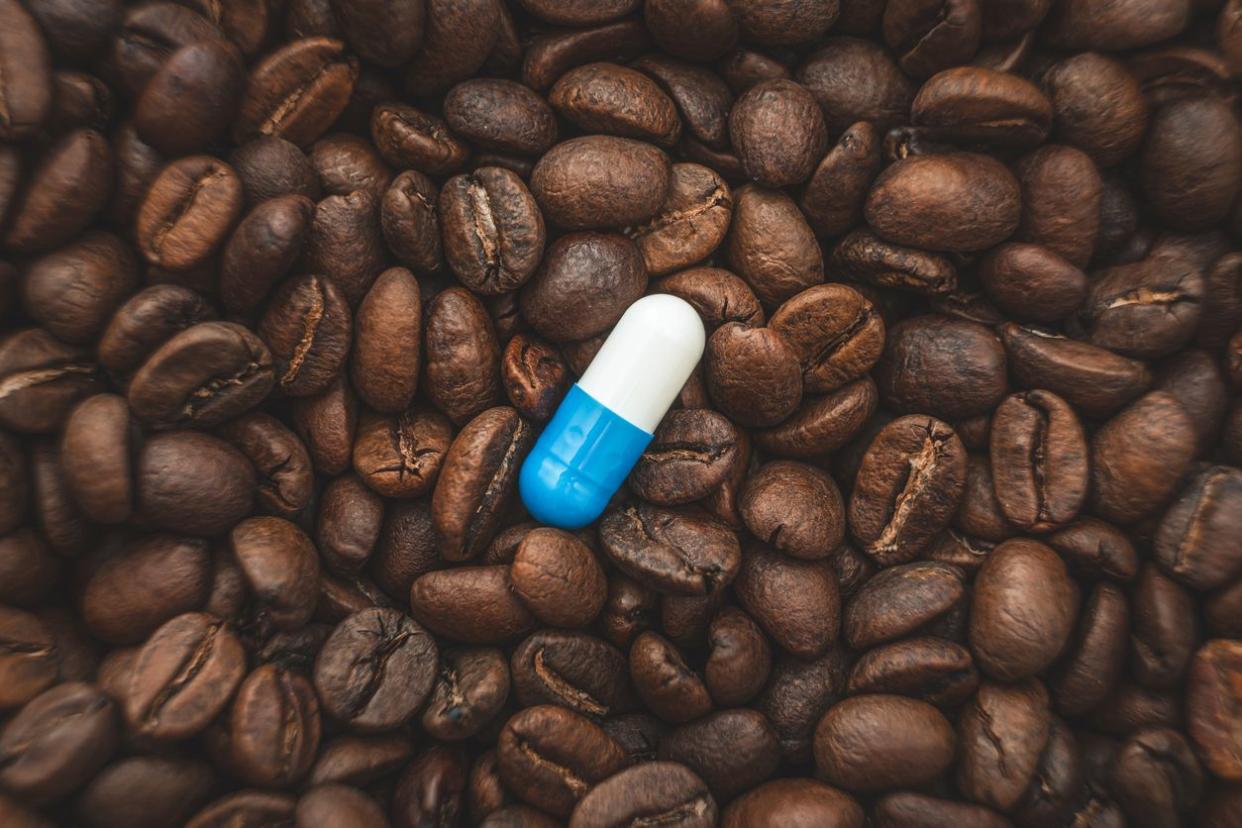
Caffeine
If we told you an extra cup of joe in the morning could help with your weight loss efforts, you’d — quite rightly — probably not believe us. But there’s some science behind this thinking.
Caffeine can act as an appetite suppressant and a thermogenic (something that increases heat production). It can also increase fat oxidation (when your body breaks down fats).
A 2018 systematic review and meta-analysis of 13 randomized controlled trials looked at more than 600 participants, both men and women.
The paper concluded that “caffeine intake might promote weight, BMI and body fat reduction.”
However, there aren’t many studies on caffeine supplements for weight loss. More research is needed here, especially since caffeine can range from a cup of coffee to supplements like green coffee bean extract or kola nut.
(Related: Weight Loss Medications: Are They Effective?)
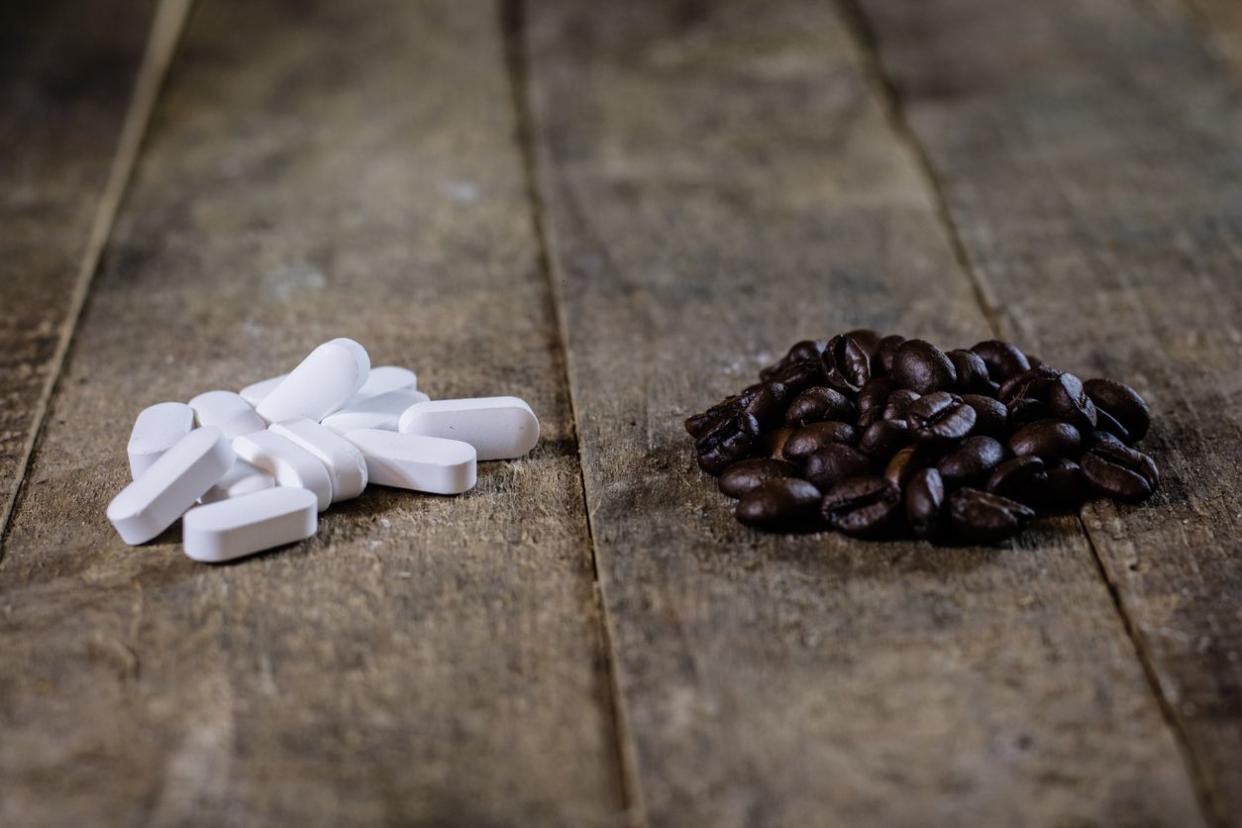
Caffeine Pros and Cons
Pros:
Caffeine intake has been linked to weight loss and a reduction in BMI and body fat.
It’s not just caffeine pills and coffee. Yerba maté, green tea and kola nut supplements have been linked to weight loss.
Cons:
Side effects include nervousness, jitteriness, vomiting and tachycardia (increased heart rate). And we all know what happens when you have caffeine too close to bedtime…hello, sleepless night.
Your body can develop a tolerance to the weight loss effects of caffeine.
While there’s some promising research, studies on caffeine for weight loss are short and use a combination of products, making it hard to compare results.
Best for: Those who don’t experience sleep problems or caffeine side effects.
Final verdict: Caffeine has been linked to weight loss, body fat loss and a lower BMI, but more research is needed on caffeine supplements.

Green Tea
Onto another popular beverage that, like coffee, can come in supplement form.
Green tea contains caffeine and catechins. These compounds can increase energy metabolism, which may lead to weight loss. As mentioned above, caffeine can suppress your appetite and increase thermogenesis and fat oxidation, which may also help with weight loss.
From the research we have so far, green tea shows some potential.
A 2012 meta-analysis looked at randomized controlled trials on both men and women with overweight or obesity. In these studies, green tea preparations were compared against a control.
Green tea intake was linked to weight loss, lowered BMI and reduced waist circumference. However, the results were small and not statistically significant.
*Eye roll*
Next up, a systematic review and meta-analysis from 2020 looked at the effect of green tea supplements on people with obesity. Green tea was linked to a reduced body weight and BMI.
It was especially effective when participants took supplements for 12 weeks and the dosage was less than 500 milligrams a day.
Overall, the researchers said green tea could be combined with a balanced, healthy meal plan and regular movement to help manage obesity.
Finally, a 2015 study looked into the effects of a green tea extract on 102 women with central obesity (accumulation of fat in the abdominal area). The women took a daily dose of almost roughly 850 milligrams of green tea extract or a placebo for 12 weeks.
At the end of the experiment, the women who had been taking the green tea supplement had:
An average weight loss of about 2.4 pounds
A reduction in BMI
A reduction in waist circumference
A decrease in total cholesterol
A decrease in low-density lipoprotein (bad cholesterol)
Lower ghrelin levels (the hunger hormone)
Increased adiponectin levels (a hormone that regulates blood sugar)

Green Tea Pros and Cons
Pros:
High-dose green tea extract has been linked with a small amount of weight loss and reduced BMI and waist circumference.
Beyond weight loss, green tea has anticarcinogenic (cancer-preventing), anti-inflammatory, antimicrobial and antioxidant properties.
It may also be good for cardiovascular disease and oral health.
Cons:
Green tea might not make that much of a difference for weight loss.
You could get side effects like nausea, stomach discomfort, constipation or increased blood pressure. These may be mild to moderate.
Some green tea extracts have been linked to liver damage.
Best for: Perhaps everyone, especially those interested in the other health benefits of green tea.
Final verdict: Green tea supplements might lead to weight loss and a lowered BMI and waist circumference, but the changes may be small.
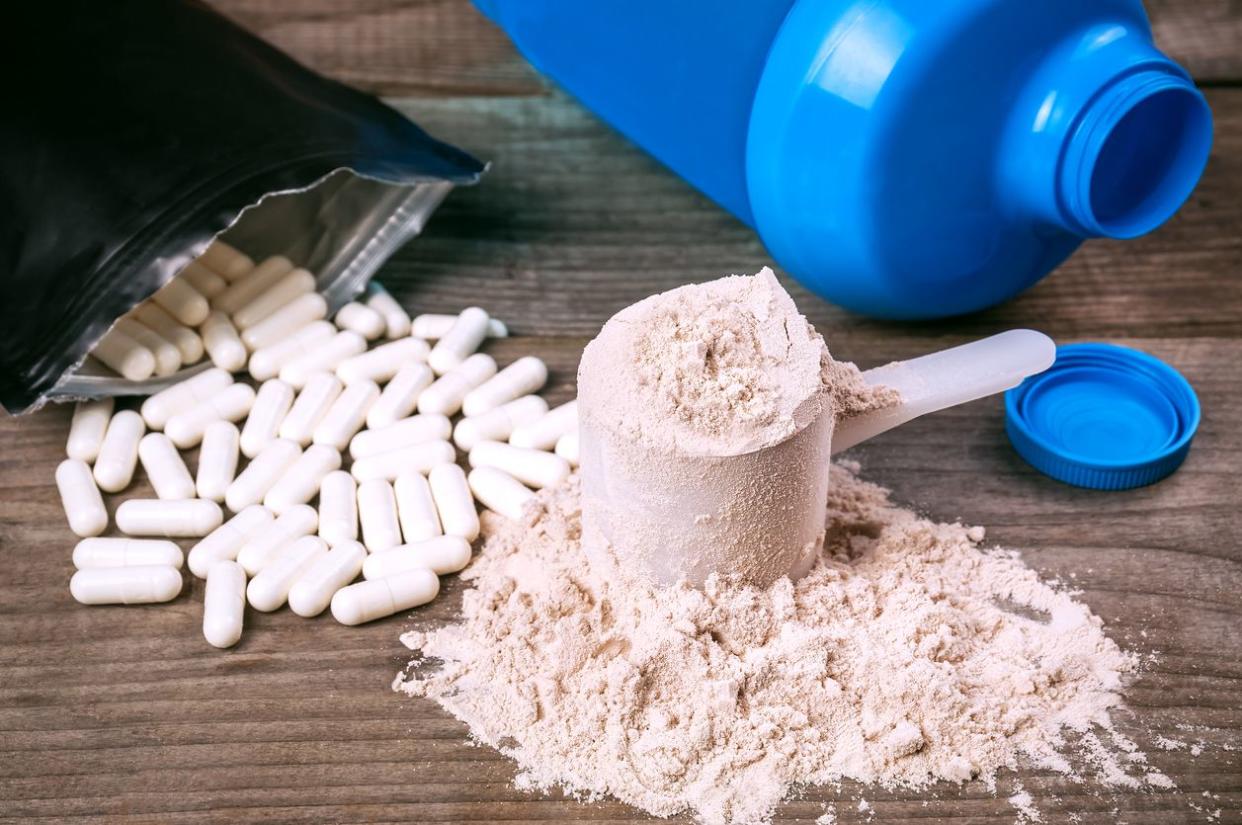
Protein
Protein conjures images of bodybuilders and gym rats, but the science on protein for weight loss is pretty solid.
Here’s what we know.
Consuming more protein than the recommended dietary allowance can:
Decrease fat mass
Reduce body weight
Preserve fat-free mass (like muscle)
Prevent weight gain after weight loss
We’ve covered this in detail in our guide to protein for weight loss.
You can get protein from food sources like meat, fish, nuts and dairy products, along with supplements like protein powders, gummies, shakes and bars.
It turns out low-carbohydrate meals or gluten-free eating aren’t king for weight loss. Protein looks pretty good.
Let’s take a look at more evidence.
A 2018 systematic review and meta-analysis compared 13 trials of whey protein supplementation in women. The results showed that whey protein led to improved body composition (the ratio of fat, muscle and bone mass) through an increase in lean muscle mass.
It concluded that “whey protein may be more beneficial for improving body composition when included as part of a weight loss program.”
Protein supplements might also help you reduce your portion sizes, if that’s something you’re trying to do. A small 2011 study found that consuming 20 grams of casein (a milk protein) or pea protein before a meal led to eating less at that meal. This was compared to drinking water before a meal.
Casein and pea protein were more effective than whey protein at increasing satiety — the feeling of fullness.
But there’s one problem here. This study only included male participants, so it’s unclear if the same effect would happen in women.
And while protein supplementation can lead to muscle growth, it may not make that much of a difference in preventing muscle loss during weight loss.
A 2018 study looked at 70 postmenopausal women with obesity. Participants were assigned to a weight maintenance group, a weight loss group with a recommended daily protein intake or a weight loss group taking a whey protein supplement.
After a five percent weight loss, the group that didn’t whey protein lost more muscle. But after a 10 percent weight loss, there was no difference in muscle mass loss between the protein groups.
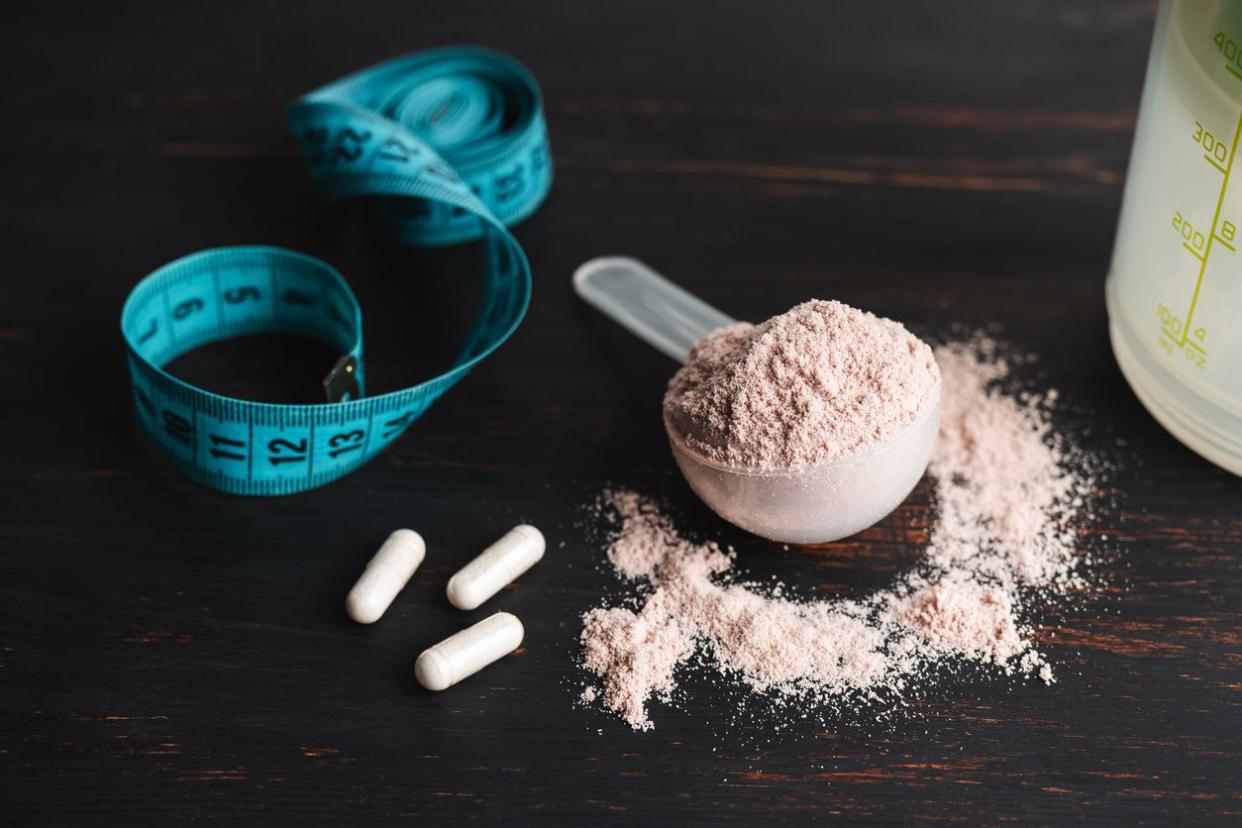
Protein Pros and Cons
Pros:
Protein may help you build or retain muscle and keep off weight you’ve lost.
If you’re vegetarian, vegan or otherwise don’t get enough protein from your diet, protein supplements can help.
Cons:
Protein intake is linked to weight loss, but more research is needed on protein supplements for weight loss for females specifically.
Best for: Women who can’t get enough protein from food sources, those looking to preserve or build muscle, or those interested in weight management.
Final verdict: Eating more than the daily recommended amount of protein is linked to weight loss, decreased fat mass, retaining muscle and keeping off lost weight. More studies on supplements are needed.

Fiber
You know when Mom said to eat your veggies? She might have been onto something.
You’ll find fiber in fruits, vegetables, legumes, whole grains and supplement form, and it may help with weight loss.
Soluble fiber has been linked to:
Increased satiety
Better cholesterol levels
Improved glycemic response (how your body regulates blood sugar after eating)
Weight loss
The proof? A 2017 systematic review and meta-analysis looked into 12 randomized controlled trials with upwards of 600 men and women with overweight or obesity. Participants supplemented with soluble fiber for two to 17 weeks.
Compared to a placebo, soluble fiber supplementation led to an average reduction in:
BMI by 0.84 units
Body fat by 0.41 percent
Body weight by almost 5.6 pounds
Not too shabby.
Beyond weight metrics, soluble fiber supplements also reduced fasting blood sugar levels and insulin levels.
But before you add fiber supplements to your grocery list, more research is needed to confirm. Although promising, the studies in this review were very different, so it’s hard to compare the results and draw any solid conclusions.

Fiber Pros and Cons
Pros:
It can be tricky to get enough fiber from food sources, so supplements can help.
Fiber supplements may be beneficial for weight loss and managing blood sugar and insulin levels.
Cons:
Fiber from food sources can help you feel fuller, but more research is needed to know if supplements have the same effect.
Best for: Those who can’t get enough fiber from food sources.
Final verdict: Soluble fiber supplementation may lead to weight loss and a reduced BMI and body fat, but more research is needed.
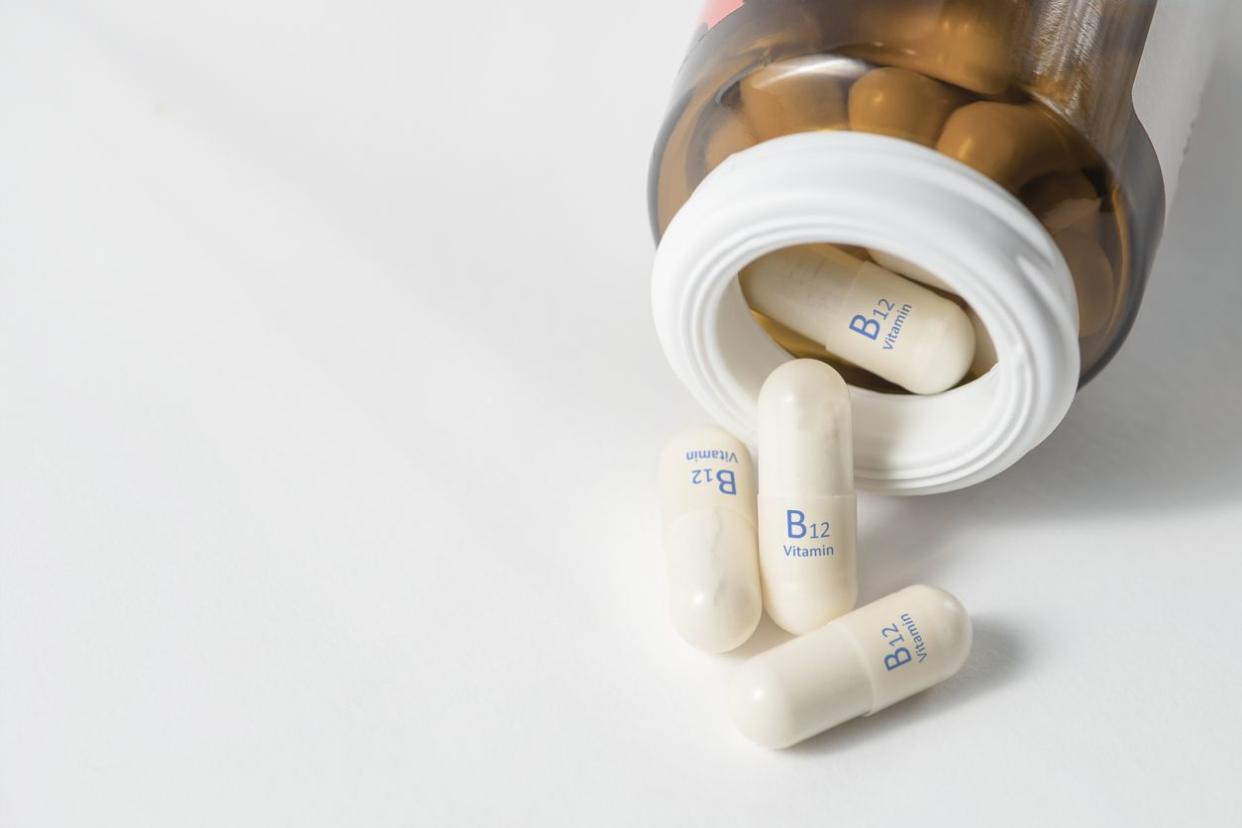
What Are the Best Vitamins for Women’s Weight Loss?
Maybe you’re already taking a multivitamin or vitamin D during the winter. But there’s one vitamin that deserves its own shout-out when it comes to the best women’s vitamins to help with weight loss: vitamin B12.
Here’s why.
Vitamin B12
Let’s jump right in with some science.
Those with overweight or obesity are at risk for vitamin B12 deficiency. A 2013 study looked at almost 1,000 male and female participants with overweight, obesity or a healthy weight.
Vitamin B12 was significantly lower in those with overweight and obesity compared to those with a healthy weight.
Vitamin B12 was also negatively associated with BMI. The lower the vitamin B12, the higher the BMI.
Beyond obesity, you may be more at risk for vitamin B12 deficiency if you:
Are vegetarian or vegan. Vitamin B12 is found in foods like meat, fish and dairy.
Take metformin long-term. Metformin is a diabetes drug sometimes prescribed off-label (when a drug is prescribed for something it isn’t FDA-approved for) for weight loss.
So, as higher levels of vitamin B12 have been linked to a lower risk of overweight, could supplements help?
A 2019 study tried to answer that question. It included almost 3,000 men and women who took folic acid (vitamin B9) and vitamin B12 or a placebo for two years.
Higher vitamin B9 levels were linked to a lower BMI, but there were no significant changes to BMI, fat max index (fat mass relative to height) or fat-free mass index (fat-free mass relative to height) from taking vitamin B9 and B12. Bummer.
However, vitamin B12 supplements could still have a place in your weight loss treatment plan.
A vitamin B12 deficiency — which, as mentioned, those with overweight or obesity are more at risk for — can lead to fatigue. And fatigue can make weight loss efforts like sticking to a healthy eating plan or getting more movement into your day much harder.
(Related: Are Weight Loss Drugs Covered By Insurance?)

Vitamin B12 Pros and Cons
Pros:
Vitamin B12 deficiency is common, especially among those with overweight or obesity and people taking metformin long-term.
If you’re deficient, a vitamin B12 supplement might boost your energy levels, helping you stick to your weight loss plan and feel better in general. Win-win.
Cons:
Vitamin B12 supplements might be better for folks with metabolic syndrome or those who have a deficiency.
More research is needed to know if vitamin B12 is an effective weight loss aid.
Best for: Potentially everyone, but especially for women who can’t get enough vitamin B12 from their diet, those with a deficiency or people with metabolic syndrome.
Final verdict: If you have overweight or obesity or have been taking metformin long-term, you could have vitamin B12 deficiency. Our comprehensive weight loss treatments include a vitamin B12 supplement to counteract this.

What to Look For in Weight Loss Supplements for Women
If you’re in the market for weight loss products for females, you’ve no doubt got some questions. How do you know which supplement is worth the money? How do you know a supplement will actually work? Which claims can you believe?
We’ve got you. This handy buying guide will help you assess weight loss supplements for women.
Red flags:
Claims that seem too good to be true. Watch out for phrases like “miraculous cure,” “scientific breakthrough,” “ancient remedy” or “secret ingredient.” Anything that says it can end cravings, burn belly fat or get you results fast should also raise an eyebrow.
Over-the-counter (OTC) diet pills for women. You’ll probably notice the above phrases on products like these. OTC weight loss pills aren’t FDA-approved and may not be safe or effective. Watch out for similar products like carb blockers, metabolism boosters or postpartum weight loss supplements (seek medical advice on this one).
Fat burners. Any product with this kind of phrase is a big ol’ red flag. These products say they increase fat metabolism or energy expenditure and reduce fat absorption. But a 2021 study says otherwise — it found that they’re not all that effective.
Low prices or money-back guarantees. If something is offering a ridiculous deal, it might be just downright ridiculous. Watch out for products promising no-risk trials or money-back guarantees.

Green flags:
Reputable brands. Look for brands you know and trust that have a history of creating safe and effective supplements. Don’t be afraid to do some digging and check out a brand’s website and socials. Look for third-party testing and certification badges from official testing organizations.
Clear ingredients. Check ingredient lists and look out for any ingredients we’ve mentioned above. If a product doesn’t list its ingredients clearly, that could be a warning sign.
Good reviews. You can’t take all reviews as gospel, of course, but they’re worth checking out nonetheless, especially if you’ve already checked that a brand is reputable and uses safe and effective ingredients. When scanning reviews, look for stories of safe, sustainable weight loss.
That’s a lot of potential flags. Choosing a weight loss supplement can feel like a scary and impossible task, but speaking with a healthcare provider can help you make the right decision.
A health professional can assess the safety of any supplements you’re considering, taking into account your personal circumstances and any health conditions you may have or medications you’re taking.
You can also talk to your provider or a dietitian to find out if you have any nutritional deficiencies and whether supplements like calcium, iron or probiotics would be beneficial.
And a professional can recommend other treatments that may be more effective for weight loss.

Are Weight Loss Supplements Safe?
Supplements aren’t approved by the FDA, so you can’t really tell if what you’re taking is safe or effective. In fact, manufacturers can (often lawfully) release a supplement into the market without even informing the FDA.
Some weight loss supplements may be contaminated with prescription drugs or chemicals not listed on the label. And many contain more than one bioactive compound, making it difficult to predict the risks.
Our advice? Consult a healthcare professional before taking any new supplements to make sure they’re not harmful to overall health and wellness.

How Effective Are Weight Loss Supplements for Women?
Weight loss supplements for women may not be as effective as they claim. It all depends on what kind of supplement you’re taking, though.
In general, there’s limited high-quality research proving weight loss supplements work.
Studies looking into specific supplements — like green tea extract, magnesium and fiber — show some promising results. But more data is needed, especially to find out the best weight loss supplements for women over men.
The best supplements for weight loss in females may depend on your unique circumstances, like your eating habits or whether you have a nutritional deficiency.
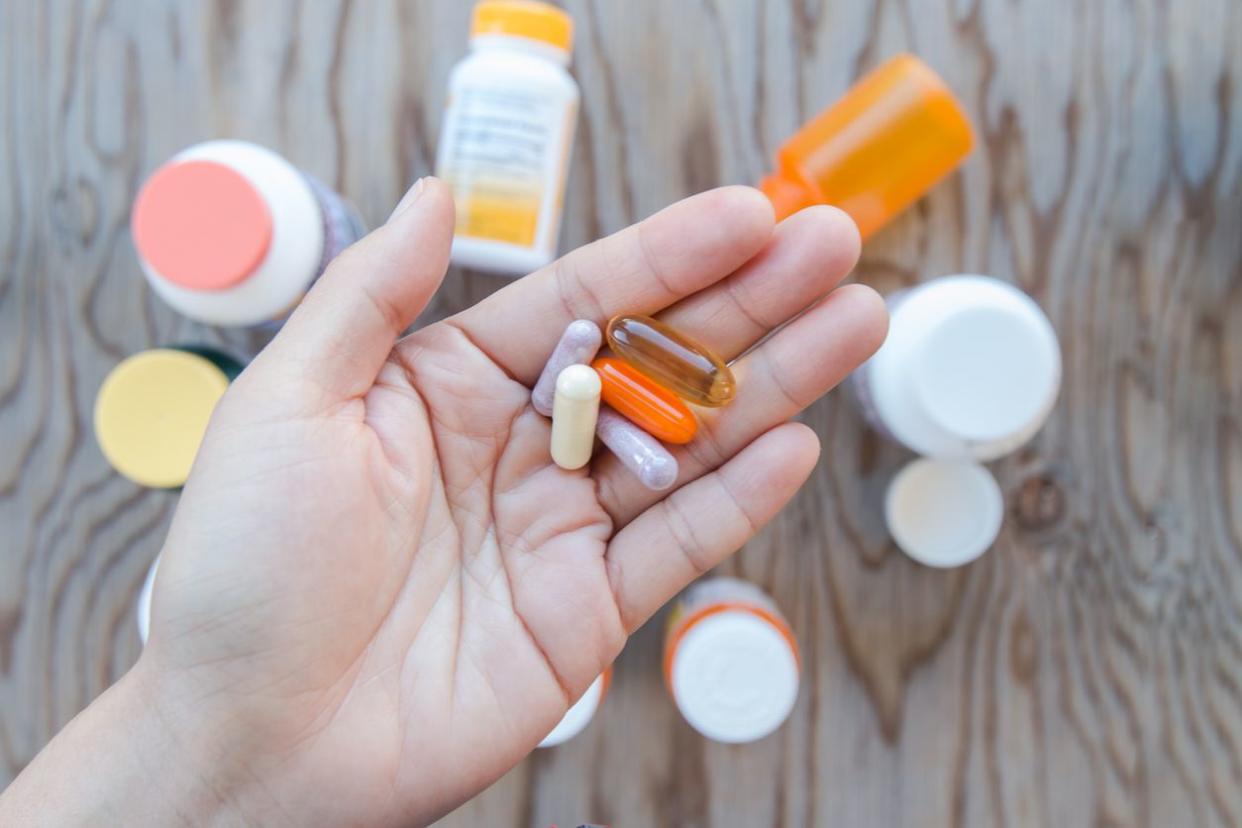
Women’s Weight Loss Supplement Alternatives
Over-the-counter weight loss supplements are unlikely to be the magic pill for weight loss some claim to be. But there are other weight loss treatments with more scientific backing.
Here are some of your options.
There are weight loss injections, such as:
Mounjaro and Zepbound (tirzepatide)
Ozempic and Wegovy (semaglutide)
Saxenda and Victoza (liraglutide)
And oral weight loss medications, such as:
Metformin
Topamax (topiramate)
Contrave (naltrexone-bupropion)
Rybelsus (semaglutide)
Xenical (orlistat)
Qsymia (phentermine-topiramate)
Want to see how these treatments stack up? Check out our guide to Ozempic versus metformin to get started.
Besides prescription medication, healthy lifestyle changes — like following a nutritious meal plan, moving your body more and getting enough sleep — can help you reach your weight loss goals.

Best Weight Loss Supplements for Women: Your Next Steps
Garcinia cambogia, glucomannan, chromium, carnitine, conjugated linoleic acid (CLA). Yes, we’re still speaking English.
These are all supplements — take one peek at a drugstore aisle, and you’ll know there’s no shortage of choice when buying weight loss supplements. But just because they’re on the shelves doesn’t mean they’re safe or effective.
Here’s what you need to know about the best weight loss supplements for females:
Weight loss supplements aren’t FDA-approved. There’s no guarantee of safety or even effectiveness, and some might be contaminated with harmful ingredients.
There are a few promising weight loss supplements. Some supplements have potential. Supplements like magnesium, fiber, protein and vitamin B12 could boost your weight loss efforts. But more research is needed, especially to find out if there’s a difference between the best weight loss supplements for women versus men.
Speak with a healthcare provider before taking a new supplement. We sound like a broken record, but we can’t stress this one enough. Before taking a new supplement, get advice from a healthcare professional. They can let you know if it’s safe and recommend other treatments that may work even better.
Weight loss supplements, even when safe and effective, are just one piece of the puzzle.
That’s because weight loss isn’t a one-size-fits-all situation. A holistic approach — combining lifestyle interventions, personalized expert advice and medications, if appropriate for you — is best.
This article originally appeared on Forhers.com and was syndicated by MediaFeed.org.
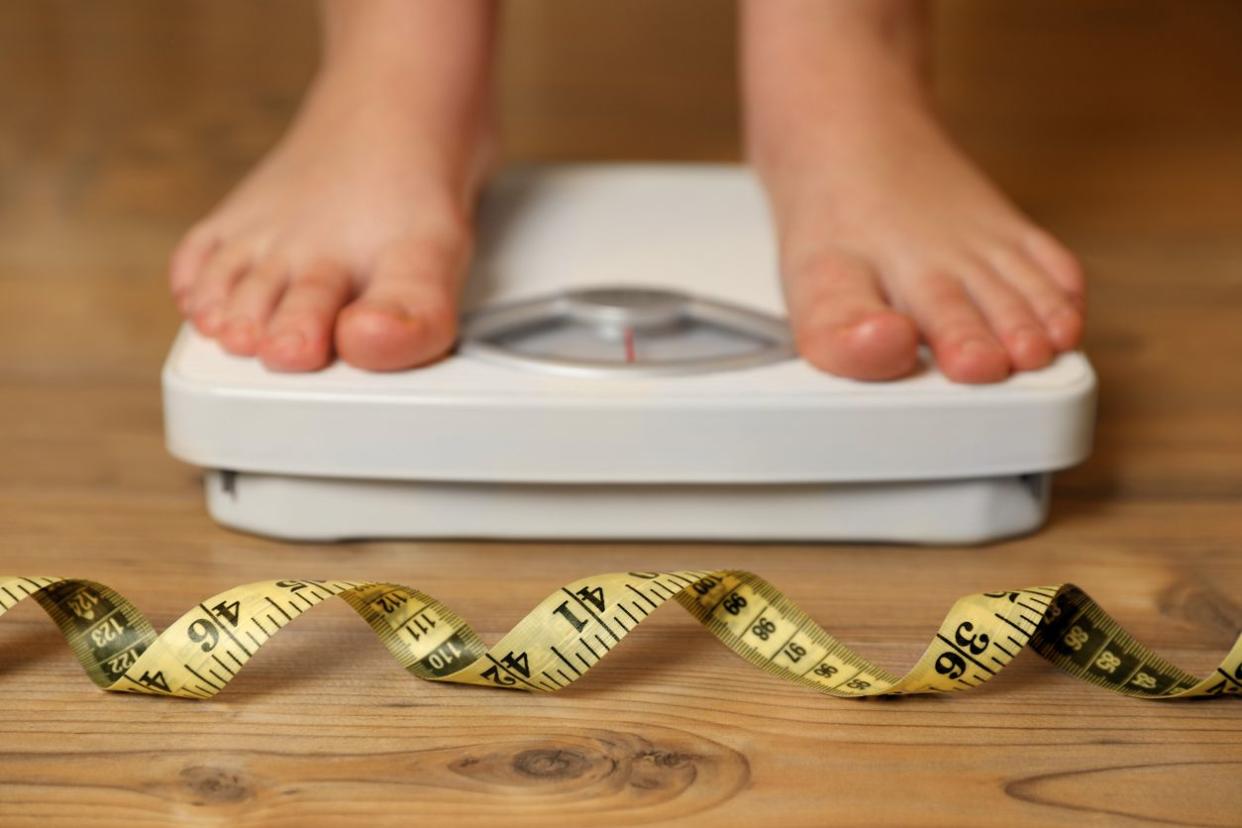
More from MediaFeed
Weight Loss Medications: Are They Actually Effective?
https://www.msn.com/en-us/news/other/weight-loss-medications-are-they-actually-effective/ss-BB1lgYxn?disableErrorRedirect=true&infiniteContentCount=0
